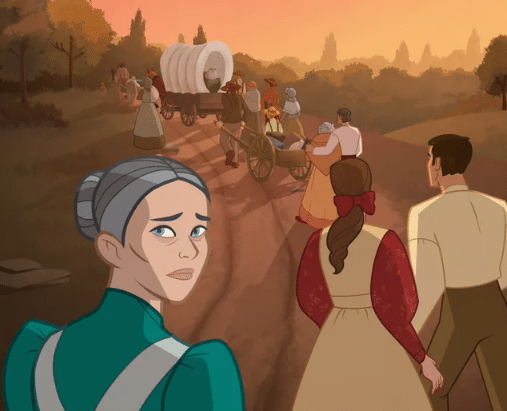The Come Follow Me manual asks the wrong questions about ex-Mormon Leman Copley.
The Doctrine and Covenants 51-57 Come Follow Me lesson scheduled for this Sunday at the Church of Jesus Christ of Latter-day Saints (LDS) describes the aftermath of Leman Copley changing his mind about hosting a Latter-day Saint commune on his farm in Kirtland, Ohio. Leman Copley eventually left the church, a fact which seems to have biased church manual writers against him. The manual suggests this question:
Have you ever suffered disappointment when someone you depended on didn’t keep their commitments?
The manual doesn’t ask the question, “Why did Leman Copley change his mind about hosting a Latter-day Saint commune on his farm? What led to that change?”
Scrolling down to the children’s section, the lesson provides more details about the Knights, a Latter-day Saint family who moved to Kirtland, Ohio from Colesville, New York, expecting to live at Leman Copley’s farm. A video shows drawings of the Knights looking devastated as Copley turns them away.
 Image from Come Follow Me children’s curriculum for Doctrine and Covenants 51-57.
Image from Come Follow Me children’s curriculum for Doctrine and Covenants 51-57.Like the Latter-day Saints who wanted to live on the Copley farm, we will all experience disappointments in our lives when people do not behave in ways we expect. It’s a good idea to talk about how we will handle these disappointments in Sunday School class. But if our goal is to become better, more moral people, we should practice reacting to those who disappoint us with empathy, concern and, at the very least, an attitude of curiosity about their point of view instead of judgment and condemnation.
The Come Follow Me manual encourages children to practice empathy, but only for the active Latter-day Saints who were turned away from the farm, not for the soon-to-be ex-Mormon who changed his mind. The questions we are instructed to ask children encourage them to think about how Leman Copley’s actions hurt active church members and steer them away from considering Copley’s perspective.
Your children could pretend to be a member of the Church who has arrived in Ohio. How would they have felt after Leman broke his covenant? What does this teach us about keeping our covenants or promises?
Labeling Leman Copley as a covenant-breaker without bothering to learn his side of the story is not a great pattern to teach. An important part of coping with disappointments about others’ actions is learning to keep an open mind and hear out someone else’s point of view.
The questions the Come Follow Me manual ask about Leman Copley echo the judgmental questions active church members too often ask about friends and family members who choose to leave the church:
Why didn’t they keep their commitments?Why are they breaking their covenants?I feel hurt because of their choices. How could they do this to me?If we want meaningful answers, we need to ask better questions.
So let’s ask the questions the manual didn’t ask. Why did Leman Copley change his mind about hosting a Latter-day Saint commune on his farm? What led to that change?
We were introduced to Leman Copley just last week, when we studied Doctrine and Covenants 49-50. But most church members won’t know his story because adult Sunday School classes skip every other week’s lesson plan for Relief Society and Priesthood Quorum, and even people who took the initiative to study on their own may have missed pertinent details about Leman Copley’s experience with the LDS Church because manual writers referenced them in the ancillary materials instead of the main body of the lesson plan.
Leman Copley was a convert, the kind that modern missionaries might call a “golden contact.” He had so much enthusiasm for the LDS Church when he converted from Shakerism that he not only offered to host a Mormon commune on his property, but also volunteered to serve a mission to his previous religious congregation. However, the church leaders who served as his missionary companions were so disrespectful to the Shakers that the experience was deeply traumatizing to Copley and led him to reconsider his membership in the LDS Church. Meanwhile, the interfaith relationship between the Mormon and Shaker communities in Kirtland, Ohio, which had been friendly until that point, rapidly deteriorated.
You can read more details about these events here: Doctrine and Covenants 49-50 “That Which Is of God Is Light
Come Follow Me: Doctrine and Covenants 49-50 “That Which Is of God Is Light”
When we ask just a few curious questions, instead of assuming the personal failings of the person who left the church are the root of the problem, we gain crucial information that leads to self awareness, and self awareness inspires more introspective questions about our own faith community, such as:
As church members, how can we better ensure that our faith community is a safe place for people to worship and thrive?How can we work to better build bridges, instead of burning them?How can we rectify the situation if we fall short in one of our stewardships?How can we better nourish new members of the church?
These are the questions I asked in my version of the lesson plan for Doctrine and Covenants 51-57 “A Faithful, a Just, and a Wise Steward” And these are also the kinds of questions we should be asking when our friends and family members leave the church.
Come Follow Me: Doctrine and Covenants 51-57 “A Faithful, a Just, and a Wise Steward”



